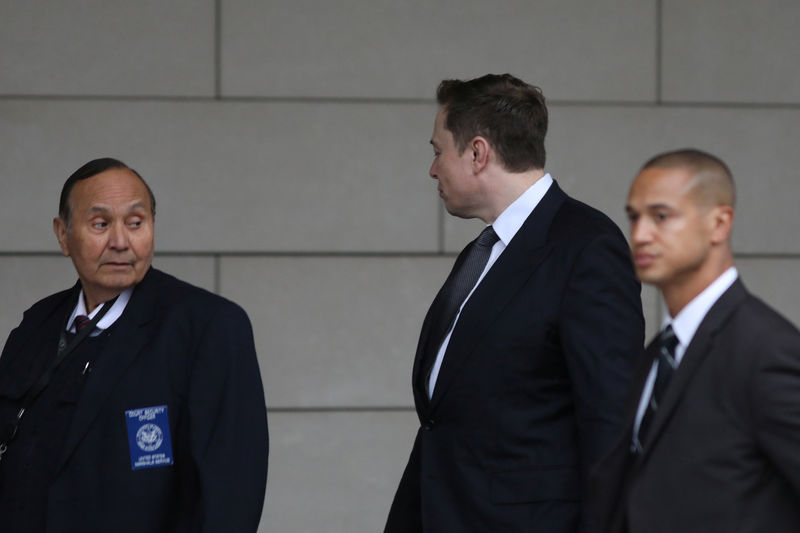By Steve Gorman and Rachel Parsons
LOS ANGELES (Reuters) - The British cave explorer suing Elon Musk for calling him a "pedo guy" on Twitter testified on Thursday that his criticism of the Tesla (NASDAQ:TSLA) Inc chief executive that led to the tweet was not a personal attack.
In the defamation trial's third day, Vernon Unsworth also refused to apologize for a July 13, 2018, CNN interview in which he said that Musk's offer of a mini-submarine to help rescue a boys' soccer team from a flooded Thailand cave was a "PR stunt" and Musk could "stick his submarine where it hurts."
"My insult was to the tube and not to Mr. Musk personally," Unsworth said while being cross-examined by Bill Price, one of Musk's lawyers. "I'm not sure how I need to apologize. It was my opinion at the time and I stand by that opinion."
Unsworth's lawsuit focuses on three Musk tweets on July 15, 2018, five days after the diver helped complete the rescue of 12 boys and their soccer coach from the cave.
Musk's first tweet questioned Unsworth's role in the rescue, while the second said, "Sorry pedo guy, you really did ask for it." The third tweet, in response to a follower who asked Musk about the second tweet, said "Bet ya a signed dollar it's true."
Unsworth, 64, said the tweets harmed his reputation by branding him a pedophile and a liar, and said on Wednesday they left him "humiliated, ashamed, dirtied."
His lawsuit seeks unspecified damages from Musk, who told the court this week his net worth is around $20 billion.
Legal experts are closely watching the case because it is believed to be the first major defamation lawsuit brought by a private individual to go to trial over a tweet.
Musk, 48, who was questioned throughout the afternoon on Tuesday by Unsworth's lawyer, has maintained his composure. He apologized to Unsworth, and suggested to jurors the stress of working 80 to 100 hours a week during a challenging period for Tesla contributed to the outburst.
Jurors are expected to begin deliberations Friday after Judge Stephen Wilson formally instructs them before the two sides give closing arguments. Wilson rejected a motion from Musk's lawyers to dismiss the case.
UNSWORTH'S REPUTATION
The Unsworth trial has revived discussion of Musk’s erratic behavior during 2018, when he also used Twitter to float a leveraged buyout proposal for Tesla that was scuttled and ultimately led to Musk paying $20 million to settle a Securities and Exchange Commission complaint.
For most of this year, however, Musk, who has nearly 30 million Twitter followers, has largely kept his public comments focused on Tesla’s new models and improved profitability and on the technical progress of SpaceX.
Musk's lawyers on Thursday tried to weaken the defamation argument, suggesting Unsworth's reputation was unsullied and that he even tried to profit from his role in the rescue, which won him plaudits from the Thai and British governments.
Asked if there was talk of his being a pedophile at a 10 Downing Street event where he stood next to Theresa May, then Britain's prime minister, Unsworth said: "Not that I recall."
Unsworth's legal team called expert witness Jim Jansen who said the Musk tweets were disseminated widely in the news media - 490 English language articles in 33 countries.
They also called Unsworth's estranged wife who gave him a character endorsement, despite the fact that Unsworth is living with his girlfriend part of the time in Thailand.
The "pedo-guy" tweet was "totally false", she said.
In his own testimony, Musk dismissed his tweets as an "off the cuff" response to watching a replay of Unsworth's CNN interview, at a time he felt overworked from running Tesla, which makes electric cars, and SpaceX, a rocket company that offered the mini-submarine.

To win his lawsuit, Unsworth needs to show Musk was negligent in publishing a falsehood that clearly identified him and caused him harm. He does not need to show that Musk acted with "actual malice," which is much tougher to prove.